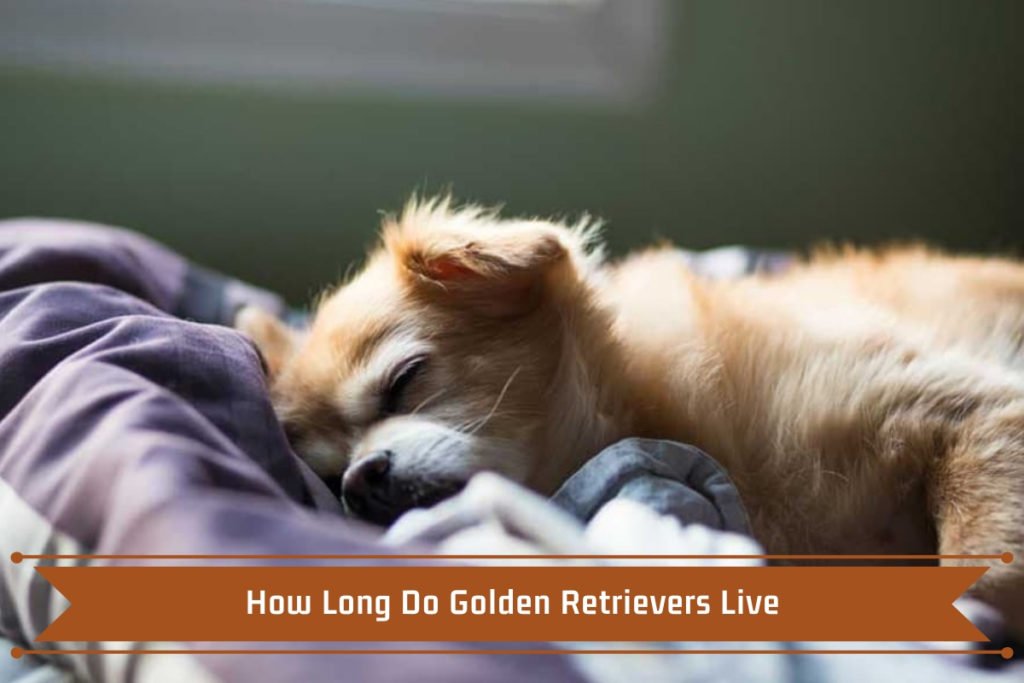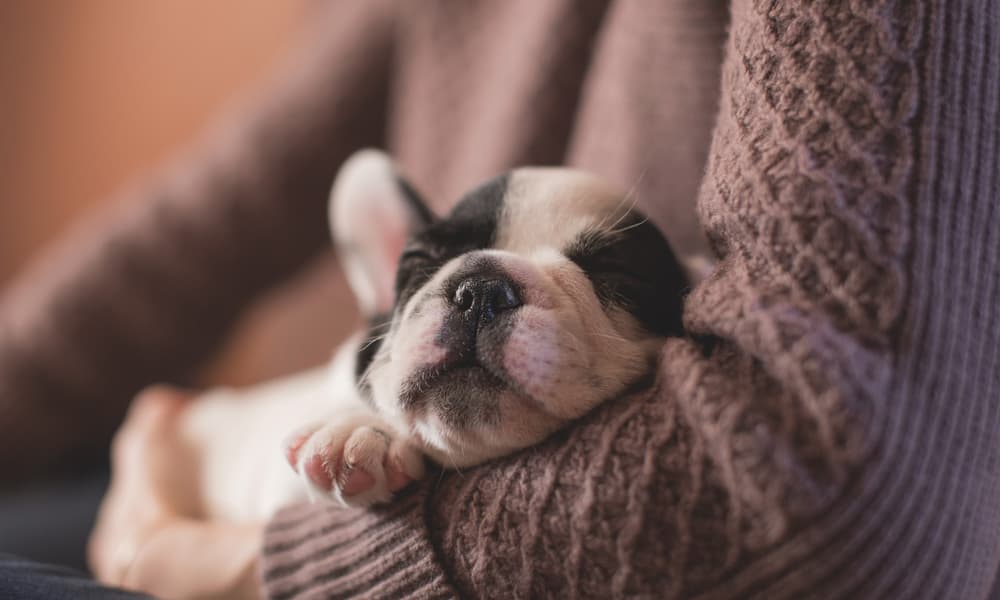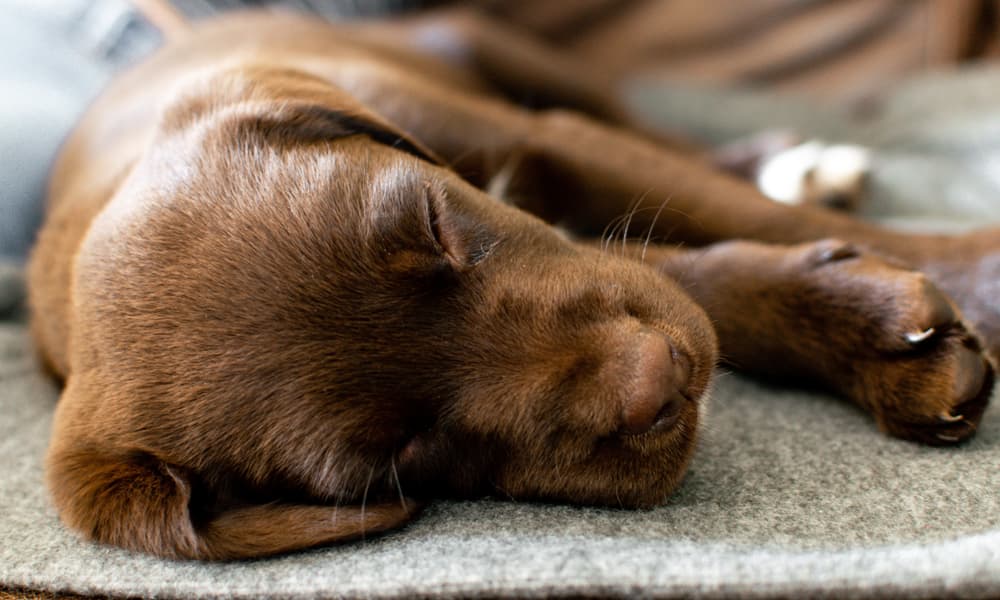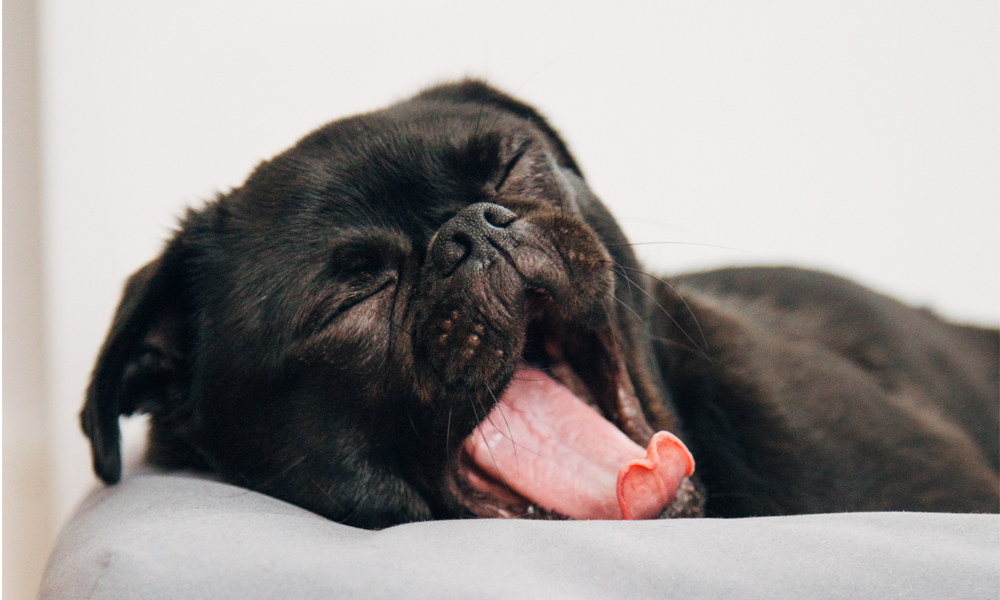
Few things in life are more exciting than getting a new puppy but it can be hard to tell if your puppy is getting too much or too little sleep. Some dog owners may be concerned about how much their puppy seems to be sleep but don’t worry. It’s normal. The average eight-week-old puppy sleeps anywhere from 18 to 22 hours per day.
But what if your young puppy spends more time acting like a little tornado, running around the house and destroying everything in its path, than resting up? If sleeping is necessary for a puppy’s development and is essential to healthy growth, what do you do when your puppy isn’t resting enough? We’re going to take you through some tips and tricks to get your puppy on a schedule to make sure that it’s getting the right amount of sleep.
Contents
How Much Sleep Is Healthy for My Puppy?
As we mentioned, it is normal for a young puppy to sleep anywhere from 18 to 20 hours per day. We know, this sounds like a lot and if you’re not prepared for the fact that your puppy is going to be sleeping so often, you may very well think that there’s something wrong with them. There is so much going on internally and externally with your puppy that they need all the rest they can get. Not only is your puppy resting up during growth spurts but sleep contributes to the healthy development of their immune system, muscles, brain, and nervous system.
When your puppy’s awake, it’s adjusting to a whole new world. There is an abundance of new sights, smells, sounds, and people ready and waiting to be explored. Puppies are constantly excited and overstimulated so it’s not uncommon to see them bouncing off the walls one minute and crashing for a good long snooze the next.
Is My Puppy Sleeping Too Much?

While it is normal for your puppy to sleep the majority of the day and night away, there is, in fact, a point where your puppy may be sleeping too much. This may be indicated by the fact that your puppy is only awake for a couple of hours at most during the day or if when they are awake, they seem sleepy and lethargic. If this is the case, it’s best to take your puppy to the vet and have them examined. There may be a health-related reason why they are oversleeping which could be that they’re dehydrated, that their food isn’t providing them with enough nutrients, or because they are actually sick. A vet can take a look at your pup and advise how best to improve the situation or if they are, in fact, just an exceptionally sleepy puppy.
Should I Let My Puppy Sleep in My Bed with Me?
Trust us, we understand the temptation of letting your new, snuggly little puppy sleep in bed with you. not just because they’re warm and adorable and soft and cuddly but also because listening to their cries is heartbreaking. We’re sorry to say, though, that you may just have to push through the heartbreak. In other words, do not let your puppy sleep in your bed with you.
Your puppy needs its own space for a few important reasons. One is that they need to develop a sense of security. To do this, give them a place with four walls relative to their size where they can feel secure. For example, your safe space is likely your bedroom, a place with four walls, where you can go and feel cozy and secure. This space is too large for your tiny puppy to feel secure, especially if they sleep on your bed as they cannot get off of without falling. Your puppy needs its own room as much as you do and a crate relative to their size can provide them with this basic sense of security. This gives them a place that’s all theirs for a cozy sense of safety that’s separate from you.
This brings us to our second point which is that your puppy needs a sense of security that’s separate from you. If your puppy is never left alone in its own space or only left alone when you leave the house, it develops a sense of fear when it’s away from you. You may end up with a puppy that develops separation anxiety and is attached to your hip. This can be cute at first and make you feel wanted but it doesn’t benefit your puppy in any way. It’s important to help your puppy grow to be independent and brave so they develop into a well-balanced adult. Fear can show in many ways in a full-grown dog and often presents as aggression, which you want to avoid.
Allowing your puppy to sleep in bed with you can also become an annoyance – they will likely wake up the second you get up to go to the bathroom in the middle of the night and have to be settled down all over again. This not only interrupts your sleeping schedule but also your puppy’s as well. They also didn’t learn how to entertain themselves or what to do when you’re not there.
How to Work with Your Puppy’s Sleeping Habits

It is likely that your puppy has already started to develop its own sleeping habits as there are times during the day when your puppy is naturally more inclined to sleep. Unless your puppy is awake and trying to wake you at outrageously inappropriate times, it’s best to work with and encourage their natural sleeping habits.
So, how do you make sure your puppy’s getting the best sleep possible? Here are a few tips for a great and fulfilling snooze.
- Do not wake a sleeping puppy – You’ve heard that you should never wake a sleeping baby. Well, puppies are babies, too, and as tempting as it may be, do not wake them when they’re having a snooze! Your puppy needs their sleep, it’s critical to their growth and development, same as with human babies. If you have children, make sure you remind them of this and ask them to please respect it and leave the puppy alone when it’s asleep.
- Scheduling the day – Keep in mind that your puppy cannot go all day without having a nap, especially when that day is filled with a lot of physical play. After a good hour of activity, a pup is ready to snooze for a few hours. Don’t plan back to back activities for your puppy and make sure you schedule some snooze time. Once they’re properly rested and refreshed from their nap, use this time appropriately for any training, activities, and any playtime you have planned for your pup.
- Create a safe place for sleeping – Creating a place that’s all your puppy’s own for sleeping (a crate, pen, etc.) with plenty of blankets and cushions is a perfect way to ensure your puppy is getting as peaceful a sleep as they possibly can. Always have your puppy go in their safe place to nap and make sure it’s in a space in your house where they won’t be startled awake by noise.
How to Maximize Daytime and Nighttime Sleep

There is a difference between daytime and nighttime sleep and it’s important to learn how to maximize the success of both. Here are some tips and tricks for both day and nighttime sleep.
Daytime
- Do not let your puppy fall asleep in your arms – We know it seems like we’re trying to deprive you of one of the joys of owning a warm, snuggly little puppy but try to avoid this as best you can. If you constantly let your puppy fall asleep in your arms, they may become dependent on you to fall asleep resulting in less sleep for both you and your puppy in the long run, which no one wants.
- Recognize when your puppy is getting drowsy – If your puppy obviously seems like they’re getting sleepy, take them to their safe space to let them fall asleep peacefully. As mentioned, it’s important to let your puppy nap undisturbed to maximize their ability to have a great sleep. Eventually, your puppy will understand that their safe space is where they should go when getting sleepy and they’ll start to head all by themselves when they need a nap.
- Recognize when your puppy is overtired – Just like a human baby or toddler, your puppy may start to exhibit unfortunate behavior when they get overtired. If your puppy starts acting out when they know better, consider when the last time was that they had a nap. They may be overstimulated and in desperate need of some downtime. Take them to their safe place and watch how quickly they fall asleep.
Nighttime
- Establish a bedtime routine – Puppies thrive on routine and having a nighttime routine is a great way to help them sleep better. Puppies like to know exactly what’s coming and when and a regular bedtime routine helps ease the transition. There are a few things you can do to make your puppy’s nighttime sleep easier on both the puppy and yourself. Restricting both their food and water intake a few hours before sleep is a good way to avoid any unnecessary nighttime accidents and additional trips to the bathroom. Make sure your puppy is tired from playtime and has gotten their fill of cuddles (for now). Take your puppy out to relieve themselves and then put them to bed just before you head to bed for the night.
- Teach your pup that darkness equals sleep – Your puppy’s sleeping area should always be both quiet and dim. Your puppy doesn’t have to sleep in pitch blackness but it’s important to establish the connection that when it’s dark outside, it’s time to sleep. To prevent your puppy from waking up as soon as the sun comes up, either use heavy drapes in the room that they sleep in or put a cover over their crate to keep the light out.
- Avoid giving in – This may be one of the hardest rules for you to follow but it’s an important one. Your puppy is more than likely going to bark, howl, and whine when you first put them into their crate for the night. It’s important that you don’t give in to this behavior or your puppy will learn that this is all they need to do for you to come and get them. As long as your puppy is properly fed, watered, played with, and has had a chance to relieve themselves before bed, there is no reason why they need you to come and get them. Always give them a treat after they enter their crate to show them that this is a great place to be. Your puppy will eventually settle down and this behavior will go away altogether once they learn that you’ll be back in the morning, and it’s time for rest.
- Be prepared to get up at least once during the night – While we did say not to give in, it’s likely that your puppy will legitimately need to go to the bathroom during the night and will let you know by whining or barking. You may wish to set an alarm at the beginning because your puppy may not be completely house trained yet. It’s important to approach your puppy calmly and to not get excited. Allow them only to do their business outside, establishing that this is not playtime. Praise them quietly after they do so and then put them right back into their crate to continue sleeping.
We hope we have given you some awesome and helpful ideas of how to maximize your puppy’s potential for a great night’s sleep. We’re not going to lie, it’s almost always difficult establishing a puppy’s sleep schedule – there’s bound to be some whining, barking, or downright howling along the way. But if you’re consistent with these tips and tricks, both you and your puppy will be on track for a great night’s sleep in no time.
I grew up in a household that was filled with animals. I believe that my fate as a dog-loving person was sealed in early childhood since my parents owned several dogs of varying sizes and breeds. There was no choice but to take care of and learn about dog habits and the best animal care practices — otherwise, I’d be clueless about how to go about the creatures I was surrounded by day and night.
As a life-long puppy lover, I know a thing or two about dogs and how to go about caring for them in the best way possible. Although I’m not a professionally trained dog behaviorist, trainer, or veterinarian, all of my knowledge and experience with canines comes from a place of love and a deep-rooted passion for dogs and animals in general.
Seeing as dogs kept me company throughout every stage of my life, I decided to follow a different path in my academic life and obtained a Bachelor’s and Master’s degrees in Marketing Management and Digital Advertising, which ultimately allowed me to combine my professional training and personal experience by creating the ultimate dog lover’s resource website! Along with my husband, Dave, I run MySweetPuppy for like-minded dog lovers who want to have a single, clear, and reliable information source about anything and everything related to dogs and their well-being.

![[HOW TO] Get Rid Of Puppy Worms Today](https://mysweetpuppy.net/wp-content/uploads/2020/09/How-much-should-I-feed-my-8-week-old-lab-puppy.jpg)

